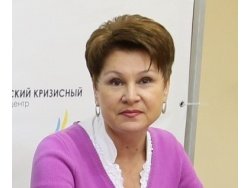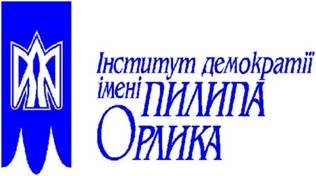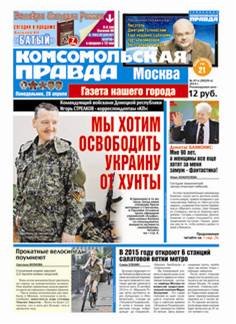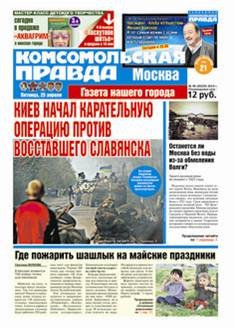Схожі новини
 Моніторинг регіональних видань у вересні 2015, проведений Інститутом демократії ім. Пилипа Орлика, продемонстрував зростання матеріалів із ознаками замовності та неналежно маркованої реклами. Найбільшими замовниками джинси стали «Солідарність», «Опозиційний блок», «Батьківщина», «Укроп», «Самопоміч», Радикальна партія Ляшка, «Наш край», «Відродження».
Моніторинг регіональних видань у вересні 2015, проведений Інститутом демократії ім. Пилипа Орлика, продемонстрував зростання матеріалів із ознаками замовності та неналежно маркованої реклами. Найбільшими замовниками джинси стали «Солідарність», «Опозиційний блок», «Батьківщина», «Укроп», «Самопоміч», Радикальна партія Ляшка, «Наш край», «Відродження».
Світлана Єременко, медіа експерт та виконавчий директор Інститут демократії ім. Пилипа Орлика (ІДПО)
 Стаття Юрія Хомайка, експерта Інститут Демократії Пилипа Орлика (ІДПО), з аналізом передвиборчої кампанії у харківських ЗМІ: до речі, що стосується власників, то уважний читач і без додаткової інформації давно міг збагнути, що «Харьковские известия» хоча офіційно є «газетою Харківської міської ради» і виходять на податки громадян, насправді виступають виключно як рупор нинішнього мера, а депутати, не згодні з його політикою, зазнають на її шпальтах нещадної критики.
Стаття Юрія Хомайка, експерта Інститут Демократії Пилипа Орлика (ІДПО), з аналізом передвиборчої кампанії у харківських ЗМІ: до речі, що стосується власників, то уважний читач і без додаткової інформації давно міг збагнути, що «Харьковские известия» хоча офіційно є «газетою Харківської міської ради» і виходять на податки громадян, насправді виступають виключно як рупор нинішнього мера, а депутати, не згодні з його політикою, зазнають на її шпальтах нещадної критики.
 Internews’ annual media consumption survey shows a dramatic drop in Ukrainians’ use of Russian media. The survey shows that Russian TV viewership shrank to 8% from 27% in 2014, and Russian internet use slid to 27% in 2015 from 44% in 2014. While lower consumption rates for Russian TV might be partially explained by the Ukrainian government’s initiative to ban transmissions of Russian TV signals within the country, internet access has not been restricted.
Internews’ annual media consumption survey shows a dramatic drop in Ukrainians’ use of Russian media. The survey shows that Russian TV viewership shrank to 8% from 27% in 2014, and Russian internet use slid to 27% in 2015 from 44% in 2014. While lower consumption rates for Russian TV might be partially explained by the Ukrainian government’s initiative to ban transmissions of Russian TV signals within the country, internet access has not been restricted.
 Internews commissioned a qualitative research on implementation of media literacy course in secondary schools of Ukraine. The study held in March-April 2015, aimed surveying teachers and students at root level to understand barriers and prospective in applying media literacy course at practice.
Internews commissioned a qualitative research on implementation of media literacy course in secondary schools of Ukraine. The study held in March-April 2015, aimed surveying teachers and students at root level to understand barriers and prospective in applying media literacy course at practice.
Conducted in cooperation with European Research Association (ERA), the research revealed that media education in secondary schools is implemented through successful combination of efforts of Academy of Ukrainian Press that trained OIPE coordinators/teachers at its schools and the Institute for Social and Political Psychology of National Academy for Pedagogical Sciences that developed the national experiment for 80 schools of 10 oblasts of Ukraine.
 16 квітня 2015 року, об 11-00 у прес-центрі «Конгрес хол» (вул. Радянська, 7, 2 поверх). Інститут демократії ім. Пилипа Орлика запрошує редакторів, журналістів, лідерів громадських організацій до обговорення питань інформаційної безпеки країни та ролі медій у стриманні інформаційної агресії з боку Росії.
16 квітня 2015 року, об 11-00 у прес-центрі «Конгрес хол» (вул. Радянська, 7, 2 поверх). Інститут демократії ім. Пилипа Орлика запрошує редакторів, журналістів, лідерів громадських організацій до обговорення питань інформаційної безпеки країни та ролі медій у стриманні інформаційної агресії з боку Росії.
 Telekritia published English translation of its survey of media consumers in eastern and southern regions of Ukraine. The survey conducted by Kyiv International Institute of Sociology (KIIS) aimed analyzing an influence of Russian propaganda on eastern regions of Ukraine including occupied areas. Researchers also asked about people's perception of political situation in Ukraine. The Telekritika/KIIS survey was supported by the Department for Rights and Labour (DRL) of US Department of State through Internews Network.
Telekritia published English translation of its survey of media consumers in eastern and southern regions of Ukraine. The survey conducted by Kyiv International Institute of Sociology (KIIS) aimed analyzing an influence of Russian propaganda on eastern regions of Ukraine including occupied areas. Researchers also asked about people's perception of political situation in Ukraine. The Telekritika/KIIS survey was supported by the Department for Rights and Labour (DRL) of US Department of State through Internews Network.
2 квітня 2015 року у Дипломатичній академії при Міністерстві закордонних справ України відбувся круглий стіл: «Інформаційна політика України як питання її національної безпеки», організований Київським офісом Інституту Кеннана, Центром дослідження Росії та Програмою академічних обмінів імені Фулбрайта в Україні.
 18 лютого 2015 року, о 13:00 в Українському кризовому медіа-центрі (готель «Україна», 3 поверх, вул. Інститутська, 4, Київ) відбувся брифінг «Інформаційна ізоляція жителів окупованих територій: як змінити ситуацію?». Майже рік продовжується неоголошена війна та безпрецедентна інформаційна агресія Росії проти України. З початком АТО багато експертів наголошували на тому, що Україна програє інформаційну війну. Але… Досі не розроблено продуманої узгодженої Стратегії інформаційної політики держави.
18 лютого 2015 року, о 13:00 в Українському кризовому медіа-центрі (готель «Україна», 3 поверх, вул. Інститутська, 4, Київ) відбувся брифінг «Інформаційна ізоляція жителів окупованих територій: як змінити ситуацію?». Майже рік продовжується неоголошена війна та безпрецедентна інформаційна агресія Росії проти України. З початком АТО багато експертів наголошували на тому, що Україна програє інформаційну війну. Але… Досі не розроблено продуманої узгодженої Стратегії інформаційної політики держави.
- У-Медіа » Медіа і демократія » Медіа моніторинг » How Russian media cover events in Ukraine
- Переглядів: 1212
- Автор: rfgtw
- Дата: 16-06-2014
How Russian media cover events in Ukraine
Категорія: Медіа моніторинг, Media Research
Coverage of events in Ukraine by Russian mass media
Monitoring is carried out by NGO "Telekritika" with support of USAID, provided through “Internews Network".
Informational anti-Ukrainian operations by Russia took place throughout the modern history of Ukraine. However, unprecedented in scale anti-Ukrainian propaganda in Russian mass media unfolded before the Vilnius Summit in the fall of 2013. Since the beginning of the Maidan in Kyiv after beating of students the amount of Russian propaganda, and thus fake information and manipulation of events in Ukraine, only increased.
First of all, state TV channels "Russia 1" and "Russia 24" have become major propagators. However, the propaganda became a part of the editorial policy of private media too, especially of those that are fully or partially funded with "Gazprom" money or committed to Putin's oligarchs, particularly NTV channel or newspapers "Komsomolskaya Pravda", "Izvestiya" and others. Impact on Western Anglophone audience is made by channel Russia Today, and numerous experts-lobbyists who appear in the Western media.
In a few months Russian mass media have made the main enemy out of Ukrainian "brotherly people".
Anti-Ukrainian propaganda in Russian mass media has the following features:
1. Excessive amounts of information about Ukraine in the Russian mass media. This information displaces any other information, including the events in Russia itself. Thus, Russian television distracts attention of society from internal problems in the country. However, creating an image of an external enemy (which in this case is Ukraine and all things Ukrainian), it mobilizes people, uniting it around the figure of Vladimir Putin (who has to become a peacemaker and savior), that is confirmed by the growth of his rating.
To illustrate, here are some of the figures on the number of allotted time for Ukrainian events in the Russian news.
|
Date |
Title of TV channel/program |
Overall length of the news release |
Time dedicated to Ukrainian news |
|
10.03.14 |
«Vesti»/Russia 1 |
54 minutes |
45 minutes dedicated to the topic of Ukraine and Crimea (10 stories) |
|
17.03.14 |
«Vremya» / Pervyi (First) Channel |
50 minutes |
35 minutes (9 stories) |
|
21.05.14 |
«Vesti»/Russia 1 |
54 minutes |
About 40 minutes (10 out of 14 topics about Ukraine in various context) |
2. Use of hate speech and rhetoric of war. Task is to demonize Ukraine and Ukrainians in the eyes of Russians and all over the world
|
Neutral lexicon |
Aggressive lexicon |
Examples |
|
Nationalists “Right Sector” |
Banderivtsi |
During the Maidan: "Arguments and Facts", 20.01.2014 Andrei Sidorchik: "Brown" rebellion in Ukraine "... At the time when the Nazis rampaged the streets of Kiev, and doctors were unable to evacuate the wounded policemen Standartenfuerer SS ... sorry, a spokesperson for the National Security Council of the United States Caitlin Hayden accused Ukrainian authorities of escalating the conflict, which, according to a statement , were "not able to recognize the rightful claims of its people" (...) Maidan has become a paradise for outright criminals who gladly act as "freedom fighters." Such "fighters" in the New Year's Eve at the Maidan robbed girls volunteers who were raising funds for cancer patients. Two other activists of Maidan, previously convicted, raped their 17-year-old teammate - not out of malice and not for political reasons, but, presumably, out of boredom". Nowadays: "Vesti"/Russia 1, 21.05.14: Story about "Right Sector". Story is telling that “Right Sector” “shoots civilians and helps carry out a punitive operation”, and also “Right Sector” uses the worst methods: spares no one, neither women nor children, and uses tortures”. One more quotation from this story: "special training of cutthroats is carried out by skilled instructors" |
|
Government of Ukraine |
Illegitimate government |
"Vesti"/Russia 1, 21.05.14: Hosts: "Ukrainian authorities began the final stage of a special operation in Donetsk and Lugansk regions, it was declared by Maidan President Turchinov. Now he is in Slaviansk and obviously will personally command, here is a quote," a mopping before Presidential elections. '" |
|
Ukrainian authorities |
Junta |
"Izvestiya", 19.05.14 Author: Kiril Benediktov "The first question that arises for me - and, I think, not just for me - when watching this story [it is about the video of detention of LifeNews journalists]: why outrages in uniform are respectfully called by our media as "enforcement force" and "military"? Just because Moscow's position in relation to junta entrenched in Kiev is vague and nebulous and the Kremlin cannot decide whether to consider the "government" of Yatsenyuk and Turchynov legitimate or not?” But journalists still have a right to their point of view, and it would be proper if the junta servants would be called as they deserve: punishers. And how else would you call those who kill the Russian people seeking to reunite with Russia? Let us at least at the level of mass media get rid of this false modesty and political correctness. Let's call a murderer - a murderer (not "Ukrainian enforcer"), and a cannibal – a cannibal (not "fighter" of “Right Sector"). Sensing that Russia is not going to send troops to the southeast, and in general to solve Ukrainian problem using the military forces, Kiev temporary players began bullying Moscow as arrogant cowardly punks bully big and strong, but obviously not wanting to fight passerby. "Hey, uncle, give me a cigarette! And another one”.
|
|
Presidential elections in Ukraine |
Illegal elections |
|
|
Anti-terrorist operation |
Punitive operation |
|
3. Use of lexicon that legitimized the invasion of Crimea by Russia, and now legitimizes the illegal terrorist groups in the East
The main task of the Russian propaganda today is to legitimize in the minds of Russians subversive and criminal groups operating in eastern and southern Ukraine as full spokesmen for interests of population of these regions. A simple trick is used for this: representatives of these subversive and criminal groups are given representative titles, such as "people's governor" or " President of the Donetsk People’s Republic".
In Crimea, Russian invaders were called "Crimean self-defense". Now subversive and criminal groups in the East are called “militias” by Russian propaganda.
4. Spreading outright lies about the situation in Ukraine. The main purpose is to discredit the country in the eyes of the international community. One of the the most vivid examples is a story of Arkady Mamontov on TV Channel Russia 1 on the construction of concentration camps in the Ukraine. A journalist called concentration camps the sites where there is a construction of temporary detention facilities for illegal immigrants that are being built under an agreement between Ukraine and the EU (link to a story - https://www.youtube.com/watch?v=FAjPfq7SBpw )
Interpretation of information about Ukraine in Russian mass media per topics:
Situation in the East
As stated above, the main task of Russian mass media in the context of developments in the Eastern Ukraine is a legitimation of subversive and criminal groups in the eyes of population and presenting Ukrainian authorities as "The Chastener" that is fighting with its own people. Russia needs a destabilization of the situation in the East also for questioning a legitimacy of the presidential elections in Ukraine.
"Vesti"/Russia 1, 21.05.14:
Host: "The closer the election day, the less shy punishers are in choosing targets. Firing by mortar and howitzer now not only at residential areas, but also at schools and even children playgrounds". And then follows story "about life under fire".


Split of Ukraine, statelessness
Russian mass media focused on the topic of "destruction of the state", "destabilization in Ukraine", “anarchy and bandits’ lawlessness” and, of course, "intimidation and threats against Russian residents of Ukraine", and, as a result, "illegitimacy of the new leadership" and "illegitimacy of future elections". Topic of a split of Ukraine and the impossibility of its existence within the defined borders began to unwind since last year. Here is an example:
"Expert" Magazine, No. 48, 2-8 December 2013
Author: Olga Vlasova, «The final draw ». Quotation:
“It is important to realize that the "final draw" on Ukraine as a whole (entirely) between Russia and Europe is impossible. The conflict around the Association Agreement has clearly showed that. Costs of "final choice" are incompatible with the very existence of Ukraine in its current form”
In parallel, there is ongoing work in social networks. “Ukraine has never had its statehood'”, “Khokhly [Ukrainians] can’t have its statehood at all'' - these are some of the theses that are being actively spread over Internet.
Presidential elections
Russian propaganda constantly emphasizes on the impossibility of holding elections in the East. There are regular reports on worsening of the situation on the eve of elections in Ukraine. All of this in a complex allegedly has to question the legitimacy of elections, and thus give reasons for Russia not to recognize those.
Here are just for an example the latest titles on the Russia Today website by tag "Elections of the President of Ukraine 2014".
" In Kyiv on the eve of the election law enforcers seized the newspaper’s editorial office that criticized the new Ukrainian authorities " (22.05.14, 12:48)
Nationalist organizations of Ukraine declared their intention to unite (22.05.14, 11:19)
Head of LPR Valeriy Bolotov: We will not allow the holding of presidential elections in the region (21.05.14, 20:50)
Vladimir Putin: Russian troops were withdrawn from the border of Ukraine on the eve of presidential elections (21.05.14, 15:11)
State Duma is holding a "round table" on the situation in Ukraine - LIVE (21,05.14, 12:27)
Ministry of Internal Affairs of Ukraine: In some regions of the south-east it is already impossible to hold presidential elections (19.05.14, 12:27)
Oleg Tsarev: You cannot hold an election when there is a punitive operation against the people (18.05.14, 21:32)
But it is a continued tendency; Russia questioned the holding of presidential elections in Ukraine from the very beginning when they were just announced.
«Russia 24», «Vesti», 01.04.2014, 13:08
«Hosted by Maria Bondareva: In the south-east of Ukraine there are mass demonstrations of local residents who demand a special status for the Russian language and integration with industrial enterprises of Russia. This was stated today at a press conference by the leader of Russian Communist Party Gennadiy Zyuganov. As to presidential elections in Ukraine, he said, the prospects to hold those honestly are rather vague.
Gennadiy Zyuganov, chairman of the Central Committee of Russian Communist Party: In the present circumstances it is impossible to conduct honest and decent election in Ukraine. When the Electoral Commission obeys people with guns in their hands, it would write any result which is was ordered».
Also Russian mass media are already preparing public opinion for a possible non-recognition of Ukrainian presidential election by Russia.
"Izvestiya", 21.05.2014:
"— Issue of legitimacy the elections will arise necessarily. Already it is clear that the electorate will not be 100% involved in the election campaign. The problem is that the West is extremely interested in achieving any result, because they need the legitimacy of the new government. It is unclear whether there will be second round of voting. Judging by the figures, which are pronounced, it can not be avoided - said Ambassador Extraordinary and Plenipotentiary, L.L.D. Vasiliy Likhachev".
Indicative in this sense is the statement of Vladimir Putin, which was actively spread by Russian mass media.
"Vesti"/Russia 1, 21.05.14:
Putin answers the question: «If elections are held, how Russia will build a relationship with the Ukrainian state?"
Putin: "Wouldn’t it be easier to hold a referendum first on all the main topics , the referendum on the constitution, adopt and then on the basis of the constitution elect the president and the parliament and further to form the government. But the current Ukrainian authorities with the support of European countries , the United States took a different decision . It will be very difficult for us to build relationships with the people who come to power on the crest of prolonged punitive operation in the South-East of Ukraine and are hindering the work of press. And not just hindering and they are behaving more and more aggressively. This, of course, in terms of legitimation and in terms of objectivity and the results will cause us more and more questioning".
Propaganda films about Ukrainian politicians on NTV Channel
NTV Channel made a series of propaganda and outright manipulative films about Ukrainian politicians, including Arseniy Yatsenyuk, Petro Poroshenko, Yulia Tymoshenko, Oleksandr Turchynov and Igor Kolomoiskyi. All films are built on false charges of politicians ( e.g. Poroshenko is accused that his chocolate is poisonous and contains "benzopyrene, which causes cancer and by the degree of danger is in line with mercury, strychnine and polonium!"; Tymoshenko is blamed for allegedly having Jewish roots ) and evaluative abusive judgments (e.g. , Timoshenko is called "zechka" [convict] throughout the entire film).
The new tendency - accusing Ukrainian mass media in propaganda
Example: in the news program "Vesti" (Russia 1) of 21.05.14 in several stories there were accusations of Ukrainian mass media, including that "Ukrainian mass media continue to depict the image of enemy." Besides, there is a separate story, which provides a commentary of Russia Today staff Graham Phillips (British citizen who was detained in Mariupol, Donetsk region by National Guard soldiers for shooting of secret military sites, later SBU announced its release and transfer to British Consul). Phillips says literally the following:
"Ukrainian news - it's not the news. It's just propaganda. No other word, just propaganda"
In parallel, there is a fierce critic of Russian journalists who allow themselves to criticize Kremlin's position on Ukraine. Thus, in the above-mentioned news program "Vesti" there was a separate story was dedicated to criticism of "Echo of Moscow" and its editor Alexei Venediktov, particularly because of the blog of Oleksandr Horobets on "Echo of Moscow" website, titled “What the staff of LifeNews was actually doing near Kramatorsk. Video evidence”. (follow the link to watch - http://www.echo.msk.ru/blog/jura777/1324262-echo/ ). Thus, "Vesti" called position of "Echo of Moscow" "skotstvo and betrayal." As to journalists who work there, it’s said like this: "These people do not deserve to be called journalists, they are traitors".

